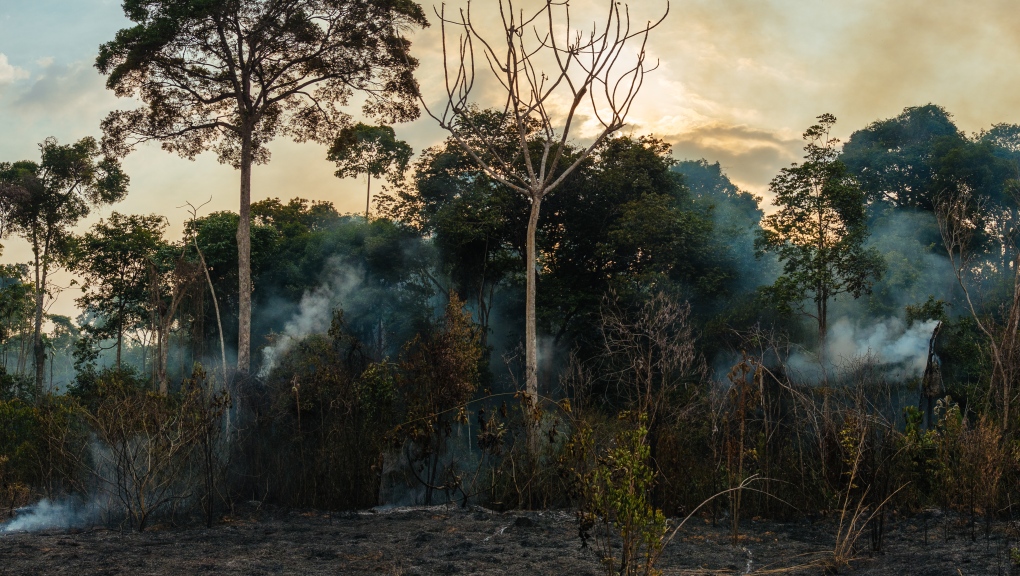About a third of the remaining Amazon rainforest has been severely degraded by human activity, and the emissions from this activity are equivalent to or even greater than emissions caused by deforestation, according to a new study.
The Amazon rainforest, at roughly 6.7 million square kilometres, is the largest forest in the world, and has long been important as a carbon sink and a biodiversity hotspot.
Although alarm bells have been ringing about the increasing reach of deforestation in the Amazon for years—around 17 per cent of the forest has disappeared over the last 50 years—human activity has been simultaneously damaging the Amazon in other ways, researchers say.
An international team of scientists found that 38 per cent of the Amazon, an area 10 times greater than the size of the U.K., has been degraded by human activity or events caused by human activity, such as forest fires and selective logging.
"Even in an optimistic scenario, when there is no more deforestation, the effects of climate change will see degradation of the forest continue, leading to further carbon emissions," Dr. David Lapola, leader of the study and researcher at the Centre for Meteorological and Climatic Research Applied to Agriculture at Unicamp, said in a press release.
The study, published this week in the peer-reviewed journal Science, is the result of an analysis of existing data, including satellite imagery showing the changes of the Amazon, and catalogues the changes in the Amazon region between 2001 and 2018.
Researchers project that by 2050, the degradation of the Amazon will be one of the major sources of carbon emissions into the atmosphere, regardless of whether or not the Amazon continues to suffer massive deforestation or not.
HOW DEGRADATION IS HURTING THE AMAZON
Deforestation is relatively straightforward—it refers to when trees are totally cleared and a new use for the land is established, such as for agriculture. Since trees store carbon, deforestation also releases a large amount of carbon emissions.
But while this phenomenon has been studied significantly, degradation is an equal threat, this new study claims, and one we need to be paying attention to.
Researchers define degradation as transient or long-term changes in an area of the forest caused by humans. This may include situations where an area loses many or even all of its trees, but the land is not repurposed for another use outside of being part of the forest.
"Despite uncertainty about the total effect of these disturbances, it is clear that their cumulative effect can be as important as deforestation for carbon emissions and biodiversity loss," Jos Barlow, professor of conservation science at Lancaster University and co-author of the paper, said in the release.
Researchers looked at the impacts of forest fires, selective logging, extreme drought and edge effects, which are changes in forests adjacent to areas that have been cleared through deforestation.
They found that between 2001 and 2018, the total area of the Amazon rainforest that was under degradation was greater than the amount lost to deforestation in that time period.
And this has huge impacts on carbon emissions.
In this new study, researchers found that carbon emissions from areas of the Amazon degraded by human activity during the study period totalled 0.2 petagrams of carbon per year. A petagram is a billion metric tons, or a unit of mass equal to a quadrillion grams, and 0.2 petagrams is roughly two hundred billion kilograms.
In the same time period, the carbon emissions from deforestation were roughly 0.06-0.21 petagrams.
Forests are the biggest form of carbon capture that exist on the planet. A report published earlier this month found that almost all of the carbon dioxide being removed from the atmosphere and stored is removed by forests, underlining the huge importance of forests in maintaining our global climate.
But scientists are worried that the Amazon is in danger of producing more carbon than it is removing from the environment, due to deforestation and degradation.
Some of the causes of degradation are directly connected to global climate change, the study stated, such as extreme drought, a type of extreme weather that has become more common as Earth warms. While tackling deforestation will aid with combatting edge effects, there need to be greater changes made globally to reduce impacts such as extreme drought and forest fires.
As the study only looks at data up to 2018, it doesn’t address whether the degradation has gotten worse as deforestation has. In 2022, deforestation in the Amazon rainforest hit a record high for the first six months, according to Reuters, with experts connecting the increase to former Brazil president Jair Bolsonaro, who stripped environmental regulations and protections during his time in office between 2019 and 2022.
Researchers also noted that degradation of the Amazon not only hurts our environment, but disproportionately affects Indigenous communities and others that rely on the forest.
"Degradation benefits the few, but places important burdens on many," Rachel Carmenta, a co-author based at the University of East Anglia, said in the release. "Few people profit from the degradation processes, yet many lose out across all dimensions of human well-being—including health, nutrition and the place attachments held for the forest landscapes where they live. Furthermore, many of these burdens are hidden at present; recognising them will help enable better governance with social justice at the centre.”
The study states that there should be a monitoring system for forest degradation and that illegal logging and use of fire should be curbed in order to cut down on these issues. And although tackling deforestation is important, the need to tackle degradation specifically is important to keep in mind, researchers say.
"Public and private actions and policies to curb deforestation will not necessarily address degradation as well," Dr. Lapola said in the release. "It is necessary to invest in innovative strategies."






































